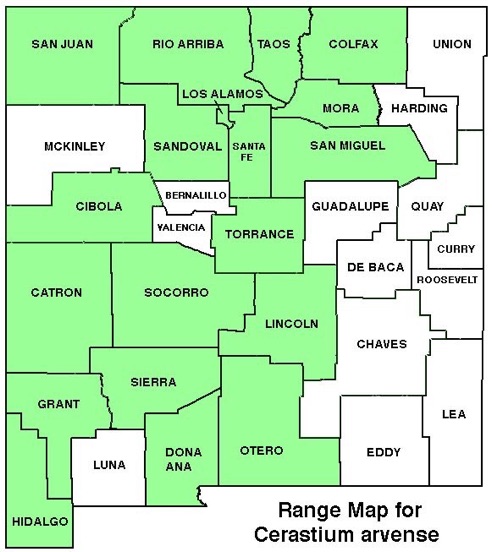WILDFLOWERS OF NEW MEXICO

Clusters of 3–6+ tiny, white flowers grow on 12-inch tall floral stems from colonies of matted, clump-forming basal branches. Note the petals are deeply cut into 2 lobes and have a greenish-yellow throat, and the glandular-hairy stems have clusters of small leaves in the leaf axils.
FLOWER: May–September. Clusters have only a few flowers. Flowers have 5 white, oval petals, each 5/16–1/2-inch long (8–12 mm) with a deep notch; sepals glandular-hairy, pointed, only half as long as petals; 10 stamens, 5 styles.
LEAVES: Opposite. Blades linear to lance-shaped, 3/8–1 1/4-inch long (1–3 cm), with bundles of small secondary leaves in the axils; surfaces slightly to softly hairy, tips pointed.
HABITAT: Sandy, gravel-loam soils, stream sides, meadows, open woods, roadsides; pinyon-juniper, ponderosa, spruce-fir, aspen, alpine slopes.
ELEVATION: 6,000–12,600 feet.
RANGE: AZ, CO, NM, UT; widespread Rocky Mt. states and Great Lakes to New England.
SIMILAR SPECIES: Mouse-ear Chickweed, C. beeringianum, in alpine areas, doesn’t have clusters of small leaves in the axils. The annual Nodding Mouse-ears, C. nutans, doesn’t have matted basal stems and the petals are 1.5 times longer than the sepals. Bushy Mouse-ears, C. fastigiatum, has multiple, tangled stems. Starworts, Stellaria, also have lobed petals but flowers have only 3 styles.
NM COUNTIES: Western 2/3 NM in mid- to high-elevation, moist habitats: Catron, Cibola, Colfax, Dona Ana, Grant, Hidalgo, Lincoln, Los Alamos, Mora, Otero, Rio Arriba, San Juan, San Miguel, Sandoval, Santa Fe, Sierra, Socorro, Taos, Torrance.









FIELD CHICKWEED
CERASTIUM ARVENSE
Pink Family, Caryophyllaceae
Perennial herb









THE CONTENTS OF THIS WEBSITE ARE COPYRIGHTED AND CANNOT BE USED
WITHOUT PERMISSION OF GEORGE OXFORD MILLER












































• Five deeply notched petals (left arrow).
• Flower has 5 styles (right arrow)










EMAIL ME







